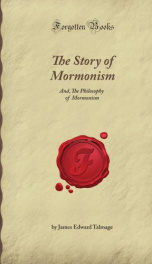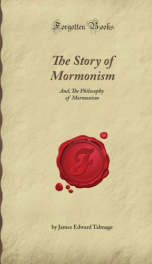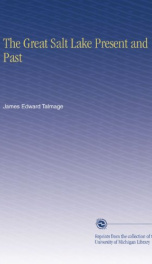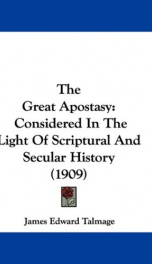Talmage James Edward

James Edward Talmage (September 21, 1862 – July 27, 1933) born in Hungerford, Berkshire, England, was a member of the Quorum of the Twelve Apostles of The Church of Jesus Christ of Latter-day Saints (LDS Church) from 1911 until his death in 1933. Talmage grew up in Hungerford, England. He was baptized into The Church of Jesus Christ of Latter-day Saints at age 10 on June 15, 1873. He moved with his family to Provo, Utah in 1877. In Provo he studied the Normal Course at Brigham Young Academy, having as one of his teachers Karl G. Maeser. He graduated in 1880. In 1881, Talmage received a collegiate diploma from the BYA Scientific Department, the first such diploma to be issued. His early predilection was for the sciences, and in 1882-1883 he took selected courses in chemistry and geology at Lehigh University, Bethlehem, Pennsylvania. Though a special student and not a candidate for a degree, he passed during his single year of residence nearly all the examinations in the four-year course and later graduated; and in 1883-1884 he was engaged in advanced work at Johns Hopkins University, Baltimore, Maryland. Talmage married Mary May Booth on the June 14, 1888. Among their children was John Talmage who wrote a biography of his father. His son Sterling B. Talmage (1889-1956) followed his example and became a geologist.[1] Talmage studied chemistry and geology at Lehigh University and Johns Hopkins University. He received a B.S. degree from Lehigh University in 1891. Talmage received a Ph.D. from Illinois Wesleyan University for nonresident work in 1896.[2] Talmage was elected to life membership in several learned societies, and for many years was a Fellow of the Royal Microscopical Society (London), Fellow of the Royal Scottish Geographical Society (Edinburgh), Fellow of the Geological Society (London), Fellow of the Geological Society of America, Fellow of the Royal Society of Edinburgh, Associate of the Philosophical Society of Great Britain, or Victoria Institute, and Fellow of the American Association for the Advancement of Science. Talmage taught science at Brigham Young Academy both before and after he went to study in the eastern United States. He served as president of the University of Deseret, now known as University of Utah, from 1894-1897.[3] From 1897-1907 Talmage was a professor of geology at the University of Utah. In 1909 Talmage was serving as the director of the Deseret Museum. He went to Detroit in November of that year to participate in diggings connected with general Scotford-Soper-Savage relics craze that involved the finding of supposed ancient relics in much of Michigan.[4] Talmage would go on to denounce these findings as a forgery in the September 1911 edition of the Deseret Museum Bulletin in an article entitled "The Michigan Relics: A Story of Forgery and Deception". He was the author of several religious books such as Jesus the Christ, The House of the Lord, The Great Apostasy and The Articles of Faith. These books are an effort to clarify LDS doctrine and are still widely read by Latter-day Saints. In 1911 the First Presidency of the Church was shocked to learn that a photographer had gained unauthorized access to the Salt Lake Temple and had taken numerous photographs of the interior. He was now holding those photographs ransom for 100,000 dollars. Talmage suggested that the First Presidency commission its own photographs of the temple. Joseph F. Smith, then president of the church, then suggested that Talmage write a treatise on the subject of the temple, to accompany the publication of the photographs. It was done and shortly thereafter the book titled "The House of the Lord" was published in 1912. Talmage also went to Washington D.C. to testify in the Smoot Hearings Talmage became a member of the Quorum of the Twelve Apostles in 1911. From 1924-1928 Talmage served as president of the European Mission of the LDS Church.[5] He died in 1933. The Mathematics and Computer Sciences Building at Brigham Young University is named after Talmage. There is also a building on the University of Utah campus named after him.
do you like this author?
What readers are saying
What do you think? Write your own comment on this book!
write a commentWhat readers are saying
What do you think? Write your own comment on this author!
write a commentBook list

The Great ApostasyConsidered in the Light of Scriptural and Secular History
Series:
Unknown
Year:
Unknown
Raiting:
3/5
Show more
add to favoritesadd In favorites

Jesus the ChristA Study of the Messiah and His Mission According to HolyScriptures Both Ancient and Modern
Series:
Unknown
Year:
Unknown
Raiting:
4/5
Show more
add to favoritesadd In favorites

the vitality of mormonism brief essays on distinctive doctrines of the church o
Series:
Unknown
Year:
Unknown
Raiting:
3/5
Show more
add to favoritesadd In favorites
Book list

The Great ApostasyConsidered in the Light of Scriptural and Secular History
Series:
Unknown
Year:
Unknown
Raiting:
3/5
Show more
add to favoritesadd In favorites

Jesus the ChristA Study of the Messiah and His Mission According to HolyScriptures Both Ancient and Modern
Series:
Unknown
Year:
Unknown
Raiting:
4/5
Show more
add to favoritesadd In favorites

the vitality of mormonism brief essays on distinctive doctrines of the church o
Series:
Unknown
Year:
Unknown
Raiting:
3/5
Show more
add to favoritesadd In favorites

the vitality of mormonism brief essays on distinctive doctrines of the church
Series:
Unknown
Year:
Unknown
Raiting:
3.5/5
Show more
add to favoritesadd In favorites

the story of mormonism and the philosophy of mormonism
Series:
Unknown
Year:
Unknown
Raiting:
5/5
Book Description: "Mormonism is a term used to describe the religious, ideological, and cultural elements of certain branches of the Latter Day Saint movement, specifically, The Church of Jesus Christ of Latter-day Saints (LDS Church).The term derives from the word Mormon, which was originally used as a pejorative term to describe those who believe in the Book of Mormon, a sacred text that adherents believe to be "another testament of Jesus Christ" and testifies of the Bible as part of the religion's canon. Today, Mormonism is used in reference to the Utah-based LDS Church, including cultural Mormons, several smaller denominations, and sects of Mormon fundamentalism whose adherents embrace the term despite opposition by the LDS Church. However, The Church of Jesus Christ of Latter-day Saints and its members rarely describe their beliefs as Mormonism. Most other Latter Day Saint movement denominations oppose use of the term in reference to their faith, and such usage is now rare even though that is what they have been called until modern usage." (Quote from wikipedia.org)Table of Contents: Publisher's Preface; Preface; The Story Of Mormonism; Chapter I.; Chapter ii.; Chapter iii.; Chapter iv.; Chapter V.; The Philosophy Of Mormonism; Chapter I.; Chapter ii.About the Publisher: Forgotten Books is a publisher of historical writings, such as: Philosophy, Classics, Science, Religion, Esoteric and Mythology. www.forgottenbooks.orgForgotten Books is about sharing information, not about making money. All books are priced at wholesale prices. We are also the only publisher we know of to print in large sans-serif font, which is proven to make the text easier to read and put less strain on your eyes.
Show more
add to favoritesadd In favorites

the story of mormonism
Series:
Unknown
Year:
Unknown
Raiting:
3.5/5
Book Description: "Mormonism is a term used to describe the religious, ideological, and cultural elements of certain branches of the Latter Day Saint movement, specifically, The Church of Jesus Christ of Latter-day Saints (LDS Church).The term derives from the word Mormon, which was originally used as a pejorative term to describe those who believe in the Book of Mormon, a sacred text that adherents believe to be "another testament of Jesus Christ" and testifies of the Bible as part of the religion's canon. Today, Mormonism is used in reference to the Utah-based LDS Church, including cultural Mormons, several smaller denominations, and sects of Mormon fundamentalism whose adherents embrace the term despite opposition by the LDS Church. However, The Church of Jesus Christ of Latter-day Saints and its members rarely describe their beliefs as Mormonism. Most other Latter Day Saint movement denominations oppose use of the term in reference to their faith, and such usage is now rare even though that is what they have been called until modern usage." (Quote from wikipedia.org)Table of Contents: Publisher's Preface; Preface; The Story Of Mormonism; Chapter I.; Chapter ii.; Chapter iii.; Chapter iv.; Chapter V.; The Philosophy Of Mormonism; Chapter I.; Chapter ii.About the Publisher: Forgotten Books is a publisher of historical writings, such as: Philosophy, Classics, Science, Religion, Esoteric and Mythology. www.forgottenbooks.orgForgotten Books is about sharing information, not about making money. All books are priced at wholesale prices. We are also the only publisher we know of to print in large sans-serif font, which is proven to make the text easier to read and put less strain on your eyes.
Show more
add to favoritesadd In favorites

the great salt lake present and past
Series:
Unknown
Year:
Unknown
Raiting:
3/5
This volume is produced from digital images created through the University of Michigan University Library's preservation reformatting program. The Library seeks to preserve the intellectual content of items in a manner that facilitates and promotes a variety of uses. The digital reformatting process results in an electronic version of the text that can both be accessed online and used to create new print copies. This book and thousands of others can be found in the digital collections of the University of Michigan Library. The University Library also understands and values the utility of print, and makes reprints available through its Scholarly Publishing Office.
Show more
add to favoritesadd In favorites

the great apostasy considered in the light of scriptural and secular history
Series:
Unknown
Year:
Unknown
Raiting:
1/5
Show more
add to favoritesadd In favorites

the articles of faith a series of lectures on the principal doctrines of the c
Series:
Unknown
Year:
Unknown
Raiting:
3/5
Show more
add to favoritesadd In favorites

The Story of "Mormonism"
Series:
Unknown
Year:
Unknown
Raiting:
4/5
Book Description: "Mormonism is a term used to describe the religious, ideological, and cultural elements of certain branches of the Latter Day Saint movement, specifically, The Church of Jesus Christ of Latter-day Saints (LDS Church).The term derives from the word Mormon, which was originally used as a pejorative term to describe those who believe in the Book of Mormon, a sacred text that adherents believe to be "another testament of Jesus Christ" and testifies of the Bible as part of the religion's canon. Today, Mormonism is used in reference to the Utah-based LDS Church, including cultural Mormons, several smaller denominations, and sects of Mormon fundamentalism whose adherents embrace the term despite opposition by the LDS Church. However, The Church of Jesus Christ of Latter-day Saints and its members rarely describe their beliefs as Mormonism. Most other Latter Day Saint movement denominations oppose use of the term in reference to their faith, and such usage is now rare even though that is what they have been called until modern usage." (Quote from wikipedia.org)Table of Contents: Publisher's Preface; Preface; The Story Of Mormonism; Chapter I.; Chapter ii.; Chapter iii.; Chapter iv.; Chapter V.; The Philosophy Of Mormonism; Chapter I.; Chapter ii.About the Publisher: Forgotten Books is a publisher of historical writings, such as: Philosophy, Classics, Science, Religion, Esoteric and Mythology. www.forgottenbooks.orgForgotten Books is about sharing information, not about making money. All books are priced at wholesale prices. We are also the only publisher we know of to print in large sans-serif font, which is proven to make the text easier to read and put less strain on your eyes.
Show more
add to favoritesadd In favorites
What readers are saying
What do you think? Write your own comment on this author!
write a commentif you like Talmage James Edward try:
readers also enjoyed
What readers are saying
What do you think? Write your own comment on this author!
write a commentGenre
if you like Talmage James Edward try:
readers also enjoyed
Do you want to exchange books? It’s EASY!
Get registered and find other users who want to give their favourite books to good hands!

